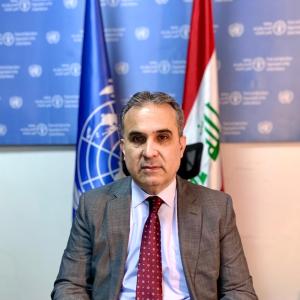FAO Iraq trains ministry of agriculture staff on good agricultural practices
03 March 2023
The Food and Agriculture Organization of the United Nations in Iraq held a training of trainers’ workshop for the Ministry of Agriculture’s staff under the project funded by the Belgian Government. The workshop aimed to train farmers on Good Agricultural Practices, which develop capacity building and technical skills in crop production, fertilization, irrigation, pest control, harvesting, and equipment maintenance, leading to improved agricultural productivity, food security, and farmers’ income.
Dr Salah El Hajj Hassan, FAO Representative in Iraq, inaugurated the workshop and emphasized the importance of raising farmers’ awareness and improving their technical skills. He also stressed that the training aimed to equip the Ministry of Agriculture’s staff with the necessary knowledge and skills to train farmers, including the new approach of Good Agriculture Practices contributing to reducing production costs, preserving natural resources, protecting the environment, and increasing farmers’ income.
The workshop was a part of FAO's ongoing efforts to support the development of Iraq's agricultural sector and enhance food security through a project that aims to improve the farmers’ technical skills and increase their productivity, leading to the sustainable development of Iraq’s agricultural sector.

He started his career in 1984, as Senior Research Assistant in the Agricultural Research and Education Centre (AREC), American University of Beirut. From 1987 to 1991, he was Coordinator of the Student Training Programme, and also Agriculture and Horticultural Teacher for the Faculty of Agriculture, at the Lebanese University.
From 1991 to 1995, he worked as Agricultural Engineer at the Ministry of Agriculture, Bekaa Regional Office, Zahlah and was then assigned to the Agricultural Research Institute in the Tal Amara station, first as Head of the Crop Production Department and subsequently in charge of the Plant Protection Laboratory. From 2002 to 2006, he was Director of the Kfardane Research Station (Agricultural Research Institute). In 2008, he became Visiting Scientist at the International Maize and Wheat Improvement Centre (CIMMYT) and Coordinator of a project with the International Centre for Atomic Energy Agency, Vienna.
In 2010, he served as Advisor to the Minister for Agriculture of Lebanon. In 2011, he became President of the Pesticide Scientific Committee, Head of the Phytoplasma Committee and Director of the Agriculture and Rural Development Programme (ARDP) (EU-funded project). From 2010 to 2013, he represented Lebanon in negotiations with EU, Egypt, Jordan and Iraq. During his career, Mr Hajj Hassan also carried out a number of other functions. He represented the Lebanese Agricultural Research Institute (LARI) in several research programmes with the International Centre for Agricultural Research in the Dry Areas (ICARDA) and the American University of Beirut. He was Coordinator of the Mashreq/Maghreb project with ICARDA, representing Lebanon in the Steering Committee, as well as being the Head of the Sugar-beet Delivery and of the Wheat Delivery Committees. For a number of years, Mr Hajj Hassan worked for the preparation of FAO TCP projects and served as the National Director of a TCP project. He joined FAO in January 2014 as FAO Representative in Yemen. Mr Hajj Hassan succeeds Mr El Zubi as FAO Representative in Iraq.



